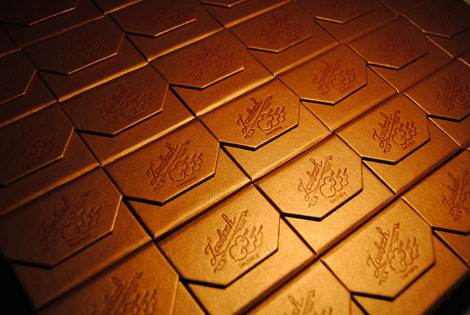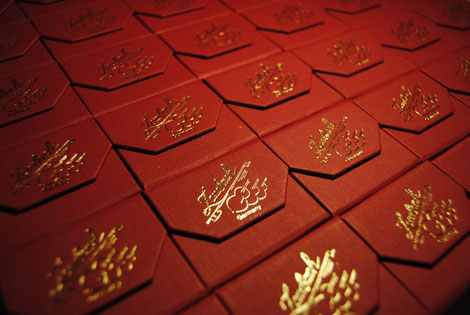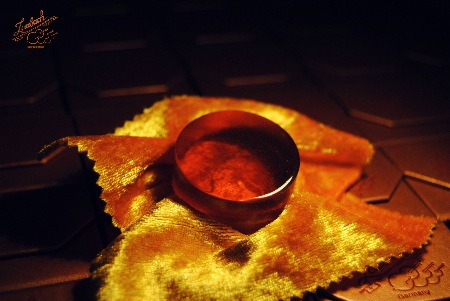Laubach GOLD rosin for violin viola cello
THE BEST GOLD ROSIN FOR VIOLIN & VIOLA
“Laubach ROSIN - top quality for professionals! World’s best musicians play with our GOLD ROSIN!
Laubach gold rosin is specifically designed for solo play and suits the Asian climate perfectly. The secret of your playstyle success lies in the Laubach gold rosin.”

Our first-class gold rosin for violin and viola with fine 999° gold powder creates a very good grip and a warm, soft and clear sound without disruptive background noises while bringing out increases resonance during the play. It's being used sparingly and it is immune to changes in humidity and temperatue.
This God rosin is for those professionals who value their instrument sound at the most !
Made from the finest material, this is the most popular professional Gold rosin for violin and viola in the world. Round rosin cake with attached cloth. Storage box is provided for protection. Made in Germany.

The premium Laubach Gold Rosin is made by hand in small quantities in the family workshop in Bavaria, Germany. We only use the highest quality natural ingredients for the exclusive rosin production that is being cast entirely by hand.

Gold particles which are embedded in the rosin provide an excellent grip on the string with low dust and maximum tone quality. The Laubach Gold Rosin enchanches the response and the feedback of the instrument during a virtuoso performance.

Our Gold Rosin is optimized for these synthetic strings: Pirastro Evah Pirazzi, Obligato, Evah Pirazzi Gold and Thomastik Dominant. It supports tone quality, carrying capacity and the excellent repsonse in an ideal way. Immediately after applying, the rosin manages to give the bow a pleasenty "Silky Smooth" effect and feel on the strings. For the best results, we recommend an economical application.

Laubach Gold Rosin is primarily used by professionals and well-known musicians. Our Gold Rosin comes in a golden premium strong cardboard box with a magnetic lid.
... "The elite crowd of the musical world uses Laubach gold rosin, and it is easy to see why. The Laubach name is best known for quality and that is exactly what you will get every time you purchase from a Laubach workshop product. Your Gold rosin will come to you magnetic packaged in a handy box that makes transporting your rosin easy. Treat yourself to the best and get your Laubach Gold rosin today! " ...
laubach rosin for cello and violin / Viola AVAILABLE IN OTHER VARIATIONS

LAUBACH VIOLIN & VIOLA ROSIN FOR QUALIFIED PROFESSIONAL PLAYERS

Laubach Violin and Viola rosin creates a characterful, bright, pure, gentle sound. For the production of exclusive rosin which is being cast by hand, we only the highest quality natural ingredients. Our violin and viola premium rosin is made in small quantities at the family workshop in Bavara, Germany.

This rosin is immune to changes in humidity and temperature. It produces very little dust and a strong grip on the string of the bow.
Laubach Professional CELLO Solo ROSIN

It creates a very powerful, rich, dark sound that is ideal for cello professional soloists. Our cello rosin is optimized for Pirastro Evah Pirazzi Gold or Spiracote and Larsen cello strings.

For best sound results, we recommend an economical application. Our professionals Cello Rosin comes in a blue and strong cardboard box with a magnetic lid.
About Gold Rosin for violin & viola and cello

Violin rosin has been used to draw sound from the violin since the first instruments were carved from wood hundreds of years ago. Historically, rosin has been made from pine resin, a natural substance found in trees. Many different companies manufacture rosin, and each variety tends to have different characteristics that affect the sound -- shading the tone toward bright or dark, and adding varying degrees of "grittiness" to the feel and sound.
Further, choosing the "right" rosin is largely a matter of personal preference. Although it functions well most of the time, pine resin does have some limitations -- it can crystallize in the cold, damage the varnish if it falls down on the violin, and it sadly often cracks or even shatters rather easily. Also, pine resin is an allergen for some, and can cause sneezing and watery eyes during playing in susceptible people, but also functions as an antiseptic used in antient Greek times.

The Laubach gold Rosin for Violin and Viola or Cello is the first natural rosin that does not damage the varnish of your stringed instrument. Further, it is not affected by humidity nor does it absorb moisture heavily, which helps it keep its tackiness without cracking in all seasons. But, most importantly, this rosin sounds very nicely -- and, when played, can not be compared to ordinary rosin. Using this gold rosin in your setup, produces a smooth tone without much grit and nice clarity. However, every player has different preferences in feel and sound of rosin.

As a violin maker, I have noticed that many of my younger customers and musicians enjoy handling and applying rosin to the bow, and so the fact that Laubach gold rosin comes in beautiful red and orange colors with visible and real gold particles gives it a modern look, which almost burns when holding it in front of sunlight that is especially appealing to youngsters and well experienced musicians. Also, young students are more likely to over-apply rosin and also not to wipe the instrument clean as frequently as necessary to prevent ordinary rosin from damaging the finish. Thus, this colorful rosin can also help extend the life of the instrument.

Violin, viola or cello gold rosin is what makes the bow stick to the string until it slips back in a continual cycle which generates the bowed sound. It is made of colophony - the residue from the distillation of turpentine. It comes in various grades depending on the type of distillation. Pure colophony is far too brittle to use on it's own for violin rosin and makes an unpleasant scratchy sound.
Therefore it is generally mixed with other substances to modify it's consistency. Most rosin will contain small amounts of oil to plasticize or soften it and sometimes there are additions of alkaline solutions to neutralize the colophony. This is why we only use natural resin ingredients and 100% real gold particles to minimize the hazard of the build up on the instrument.
Laubach Gold Rosin for Violin and Viola REVIEW from Violinista
Laubach Gold Rosin Review:
Frequently Asked Questions about Gold Rosin
-
Why Violin Rosin?
New violin bows often do not produce any sound because they need gold rosin. Rosin is extremely important because it provides the bow hair with friction in order to produce a sound when the bow is pulled across the violin strings. Without rosin, the bow will slide across the violin strings and produce a faint whispery sound (or no sound at all). Rosin comes in hard, round or oblong "cakes" of resin.
-
violin, viola and cello Rosin instructions
Before applying rosin, tighten the bow hairs by gently turning the tension screw (avoid over tightening). Place the bow hairs flat on the rosin at the "frog" of the bow (near the bottom where the tension screw is), and gently rub the bow hairs up and down a few times (as if scrubbing a small spot on the floor).
Then, draw the bow hairs straight across the violin gold rosin until the tip of the bow is reached. Repeat the same gentle scrubbing motion at the tip of the bow, and pull the flat bow hairs back to the frog again. Repeat this process across the full length of the bow several times. After each playing session, use a soft, dry cloth to remove rosin dust from the strings and body of the instrument.
-
Violin, Viola ar Cello rosin test
There aren't specific requirements for how often or how long to rosin a bow, but there is a simple test to determine if the bow has enough rosin: using the back of your thumbnail, pull it sideways across the hair of the bow (under the bow hair, near the frog).
If a small puff of rosin can be seen, the bow has enough violin rosin. Never use your fingers to test if the bow has enough rosin or the natural oil from your fingers will get on the hair of the bow and cause the bow to slide even more. Too much rosin can produce a raspy, scratching sound, and can result in rosin caking the strings.
-
Additional sound guidelines
Key elements in producing a good, solid tone on the violin are: Sufficient pressure while drawing the bow across the string. Proper placement of the bow in relation to the bridge. Speed of the violin bow.
Kommentar schreiben
Carlos (Mittwoch, 25 März 2020 23:07)
Your Gold Rosin: I use a rosin from Germany with Gold particles in it. Laubach GOLD. It isn't cheap, but it really is so adherent - you feel your bow hairs glued to the string in such a way that it is almost difficult to pull the two apart ! This is obviously good for the sound. The tone quality is so rich and full when using this rosin. I estimate it is 3 to 4 times better than anything else. The maker is I. Laubach and he uses gold in the rosin to give different tonal results. Effectively you play with gold dust......I call this my "Magic rosin". It is interesting how Pirastro advertise different rosin blends for their different strings. This shows how critical the whole business is ! With a cheap, powdery, yellow, Chinese rosin you obtain no adherence and a lot of powder - and no body to the sound. The main purpose of rosin is to roughen bow hairs so they adhere and grip the string, displacing it so that it vibrates. It connects the bow hairs to the string. This is an important stage in sound production - do not economize here! I cannot recommend it strongly enough - it is amazing !!
Benoit ROLLAND (Samstag, 12 März 2022)
Hello, I am a bowmaker based in Boston USA, and I recommend your rosin since a while to all my customers because it is one of the best rosins I know. The issue is that musicians complain they struggle finding the best way to order it, and many of them give up because of this. Do you have a retailer in the US, or if you don't, when do you think you'll have one? What is the best way to order? Thank you for your time - Benoit Rolland
Leyth Elmani (Sonntag, 04 August 2024 14:32)
Hello,
I hope you are well.
I am a student at the Royal College of Music and your Laubach Gold Rosin was recommended to me.
Could you please give me instructions as to how to order it and further information on international orders as I am currently outside Europe.
Best,
Leyth